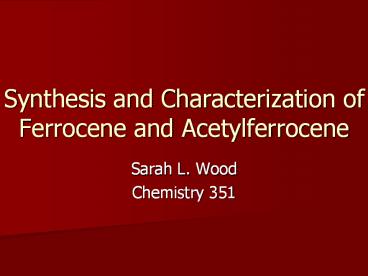Synthesis and Characterization of Ferrocene and Acetylferrocene
1 / 21
Title:
Synthesis and Characterization of Ferrocene and Acetylferrocene
Description:
Synthesis and Characterization of Ferrocene and Acetylferrocene Sarah L. Wood Chemistry 351 Synthesis and Characterization of Ferrocene and Acetylferrocene Sarah L ... –
Number of Views:1990
Avg rating:3.0/5.0
Title: Synthesis and Characterization of Ferrocene and Acetylferrocene
1
Synthesis and Characterization of Ferrocene and
Acetylferrocene
- Sarah L. Wood
- Chemistry 351
2
Background of Ferrocene
I. UH OH! Ferrocene - C5H5FeC5H5 A. Kealy and
Pauson 19511 B. 2C5H5MgBr FeCl2 ?
C5H5FeC5H5 MgBr2 MgCl2 C. Wilkinson,
Roseblum, Whiting, and Woodward2 D. sandwich
compound i.e. metallocene
Picture is courtesy of http//encyclopedia.thefre
edictionary.com/Ferrocene
3
Background of Ferrocene
- Welcome organotransition metal chemistry
- A. First example of Cyclopentadienyl Complex, Cp
3 - B. Cp group is used as stabilizing ligand3
- C. Led to better methods of synthesis
- D. Thousands of Cp complexes have since been
synthesized3
4
Background of Ferrocene
- Characteristics of Ferrocene
- A. orange coloration
- B. needle-like crystals
- C. Stability to water, air, and acid2
- D. Ease of sublimation
- E. Ease of acetylation 106 more likely than
Benzene4
5
Background of Friedel-Crafts Acetylation
- I. Reaction of an aromatic hydrocarbon with an
acyl halide.5 - Ex
6
Background of Friedel-Crafts Acetylation
- Ferrocene
- A. has been referred to as superaromatic
compound3 - B. acetylated under milder conditions
phosphoric acid4
7
The Acetylation Note I only got the
monoacetylated
Picture courtesy of http//cas.bellarmine.edu/che
m117a/lab/Ferrocene.htm
8
Background of Acetylferrocene
- Characteristics of Acetylferrocene
- C12H12FeO
- Lighter orange color
- Thicker crystals
- Stable
- Since acyl group is deactivating, only a little
product is diacetylated3
9
Methods
- Cyclopentadiene Synthesis
- Dicyclopentadiene dimer cracked
- Problems
- Courage doesnt always roar. Sometimes courage
is the quiet voice at the end of the day saying,
I will try again tomorrow. Mary Anne Radmacher
10
Methods
- Ferrocene Synthesis
- A. Grind KOH and FeCl2H2O
- B. 100-mL 3 neck round bottom
- 1. 14.587 g of KOH
- 2. 30 mL of 1, 2- Dimethoxyethane
- 3. 3.0 mL of cyclopentadiene
- C. Pressure Equalizing Dropping Funnel
- 1. 12.5 mL of DMSO
- 2. 3.239 g FeCl2H2O
- D. 41.5 mL of 6 M HCl and 49.45 grams of ice
- E. Suction filtration
- F. Cold finger
11
Methods
- Acetylferrocene Synthesis
- 10-mL round bottom flask
- 299.3 g ferrocene
- 6 drops 85 phosphoric acid
- Heated
- 4.0418 g ice added
- Neutralized by NaHCO3
- Suction Filtration
12
Methods
- Product Separation
- Erlenmeyer Flask
- Dry solid
- 4 mL hexanes
- Modified Steam Bath
- Decanted and colorizing charcoal added
- Filtered
- Cooled
- Filtered, collected, and rinsed with cool solvent
13
Characterization
- Melting Point (degrees Celsius)
- A. Ferrocene
- 1. Experimental 171.2 173.3
- 2. Literature 172 174 8
- B. Acetylferrocene
- 1. Experimental 69.9
- 2. Literature 85 -86 8
14
Characterization
- Infrared Spectroscopy (IR)
- A. Solvent Hexanes
- B. Range Shown 1700 -2300 cm-1
- C. Ferrocene
- 1. no peaks
- D. Acetylferrocene
- 1. peak at 1684.89 cm-1
- 2. literature confirms correct region for CO
in carbonyl group6
15
Characterization
III. Gas Chromatograph Mass Spectroscopy (GC mass
spec) A. Solvent chloroform-d B.
Ferrocene 1. 186 ferrocene 2. 121 loss
of Cp ring 3. 56 loss of both Cp rings
atomic weight of Fe C. Acetylferrocene 1.
228 acetylferrocene 2. 213 loss of
CH3 3. 185 loss of CO ferrocene minus one
hydrogen 4. 129 appears to be two Cp
rings 5. 121 - loss of one Cp ring 6. 71
iron CH3 7. 56 loss of both Cp rings
atomic weight of Fe 8. 43 COCH3
16
Characterization
- Ultraviolet Spectroscopy (UV vis)
- Solvent hexanes
- Ferrocene
- Absorbance maxima at 440.97 and 325.02 nm
- Literature shows 440 and 325!7
- Acetylferrocene
- Absorbance maxima at 446.03 and 319.07 nm
- Literature shows 320, but the 446.03 is due to
the ferrocene impurities in the sample.7
17
Characterization
- 1H-Nuclear Magnetic Resonance Spectroscopy
(1H-NMR) - A. Solvent chloroform-d
- Ferrocene
- 1. 7.2935 - solvent
- 2. 4.2199 Cp rings all same3
- 3. 1.5805, 1.4616 impurities
- Acetylferrocene
- 1. 7.2947 solvent
- 2. 4.1941, 4.2428, 4.5411 Cp rings and acetyl
group3 - 3. several from 0.10 1.60 probably impurities
18
Characterization
- 13C-Nuclear Magnetic Resonance Spectroscopy
(13C-NMR) - Solvent chloroform-d
- Ferrocene
- Several between 76 and 78 solvent
- 68.178 Cp rings
- Acetylferrocene
- 1. Several between 76 and 78 solvent
- 2. 69.640, 69.899, and 72.379 Cp rings and
acetyl group - 3. 27.470 methyl group3
19
Conclusion
- Ferrocene synthesized
- Acetylferrocene synthesized
- Melting Point
- IR
- GC mass spec
- UV vis
- 1H-NMR
- 13C-NMR
20
Future Work
- Larger Product Yields
- Get acetylation off microscale
- Complete Separation of products
- More efficient cracking column
21
References
- Jolly, William L. The Synthesis and
Characterization of Inorganic Compounds.
Prentice-Hall, Inc Englewood Cliffs, NJ. 1970.
pg. 4-5,407,484-487. - 2. Williamson, Kenneth L. Organic Experiments
Ninth Edition. Houghton Mifflin Company
Boston, MA. 2004. pg. 352-353,502-506. - 3. "Friedel-Crafts Acylation of Ferrocene".
- http//cas.bellarmine.edu/chem117a/lab/Ferrocene.
htm. (accessed 29 January 2005) - 4. Szafran, Pike, Singh. Microscale Inorganic
Chemistry A Comprehensive Laboratory
Experience. John Wiley Sons, Inc. New York.
1991. pg. 302. - 5. Brown, William H., Foote, Christopher S.
Organic Chemistry Third Edition. Thomson
Learning, Inc. 2002. pg. 810-811. - 5. Wade, Leroy G. J. Chem. Educ. 1978, 55, 208.
- 6. Field, Sternhell, Kalman. Organic Structures
from Spectra Third Edition. John Wiley Sons,
Ltd. Hoboken, NJ. 2002. - 7. Tanner, Pamela S. Jones Jr., Wayne E. Myers,
Clifford E. Whittingham, Stanley M. Presented
at the 210th National Meeting of the American
Chemical Society, Chicago, Il, August 1995
paper CHED 51. http//imr.chem.binghamton.edu/lab
s/ferrocene/ferrocene.html (accessed January
2005)































